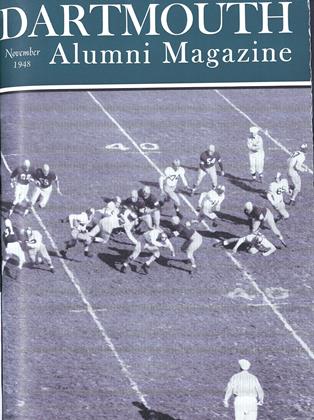THESE BRACING fall afternoons, disciplined bands of well-muscled young men are engaged in various forms of derring-do on the gridirons of a certain eight or ten institutions of higher learning in the eastern United States. These spirited young men perform their weekly heroics before crowds composed partially of streetlevel or air-breathing alumni and partially of the alumni of the subway variety who periodically appear at all athletic contests in the metropolitan areas. The clients at the above contests are predominantly of the former categorythat is, old Dartmouths, Yales, Harvards, or Cornells, who emerge into the winy sunshine once or twice a year to see Alma Mater engage in skilled and exciting combat with representatives of sister institutions with similar traditions, standards, and (usually) football material.
This group of educational establishments is known to the devoted readers of the metropolitan press as the Ivy League. Weekly standings of the respective football teams are carefully tabulated and champions are unofficially crowned following the end of the season. Formal organizations among these institutions have long existed in basketball, baseball, track, swimming, tennis and (in a somewhat more restricted sense) hockey. Soccer joined the parade this fall, with the formation of its own Ivy League. The establishment of these organizations has enhanced the prestige of the sports, the edification of the spectators, and the incentive of the performers.
Dartmouth has played an outstanding role in these leagues, especially in basketball and hockey. Last spring, we won the baseball championship. But the Ivy League in football is technically still only a beautiful dream, existing in the fertile imaginations of the gentlemen of the press. It also exists in even more informal fashion in the minds of the various alumni, who would rather see their football teams play (and defeat) the teams of some institutions than others, with no invidious implications. A large number of interested persons would thus presumably like to see this fond dream of an Ivy League become a reality, a dejure as well as a de facto organization.
We are among those who would welcome such a step. Certain tangible and intangible benefits might accrue therefrom. One such benefit might involve the increased regularization of scholastic entrance requirements and eligibility rules for young men of sterling moral character who, fortuitously, can also do things to or with a football. The related problem of scholarship aid for deserving halfbacks and tackles, discussed so lucidly in this journal last month, could also stand some more serious thought. The schedules of the constituent institutions (most of whom currently play mostly Ivy League opponents) might be arranged in somewhat more orderly fashion than heretofore. Such an arrangement, incidentally, need not preclude the continuance of traditional rivalries. The formation of an Ivy League might also provide an incentive at a vital spot in the inevitable struggle with professional football for paying customers. We hesitate to introduce the practical note of gate receipts into this idyllic picture but, so long as football pays the way for other athletic activities considered equally character-building if somewhat less lucrative, the pecuniary question must be faced.
These are some of the pertinent considerations that come readily to mind in this temperate effort to crystallize one segment of public opinion about an Ivy League. Beginning with the current issue of this MAGAZINE, we shall carry the unofficial standings of this nonexistent body, thereby emulating our colleagues of the metropolitan press. In the perennial question of overemphasis or deemphasis of college football, this journalistic effort, we suppose, falls on the former side of the ledger. If so, we happily plead guilty. We enjoy college football. It's fun. And, in the days of mounting international tensions, atomic weapons and fears of another war, it is comparatively mild and harmless fun. If this is emphasis, let us make the most of it.
 View Full Issue
View Full Issue
More From This Issue
-
 Article
ArticleCIVIL RIGHTS IN AMERICA
November 1948 By ROBERT K. CARR '29, -
 Article
ArticleA Report from Europe
November 1948 By EDWIN A. BOCK '43 -
 Class Notes
Class Notes1924
November 1948 By JAMES T. WHITE, RICHARD A. HENRY -
 Class Notes
Class Notes1918
November 1948 By ERNEST H. EARLEY, DONALD L. BARR, DAVID L. GARRATT -
 Article
ArticleConvocation Address
November 1948 -
 Class Notes
Class Notes1929
November 1948 By F. WILLIAM ANDRES, EDWIN C. CHINLUND, MORTON C. JAQUITH
FRANCIS E. MERRILL '26
-
 Sports
SportsSQUASH
February 1946 By Francis E. Merrill '26 -
 Sports
SportsWith Big Green Teams
August 1946 By Francis E. Merrill '26 -
 Sports
SportsTENNIS
June 1947 By Francis E. Merrill '26 -
 Sports
SportsDARTMOUTH 19, HOLY CROSS 6
November 1948 By Francis E. Merrill '26 -
 Article
ArticleTesreau Memorial
July 1950 By Francis E. Merrill '26 -
 Sports
SportsBASKETBALL
March 1951 By FRANCIS E. MERRILL '26
Article
-
 Article
ArticleJOHN SPAGHETTI, WITH BASKET ON ARM, RETURNS TO TOWN
December, 1922 -
 Article
ArticleIn Brief . . .
June 1954 -
 Article
ArticleForeign Study Open
OCTOBER 1958 -
 Article
ArticleWomen's center on
June 1987 -
 Article
ArticleEleazar's Spirit Goes West
FEBRUARY 1969 By SEYMOUR WHEELOCK '40 -
 Article
ArticleThayer School
October 1952 By William P. Kimball '29

